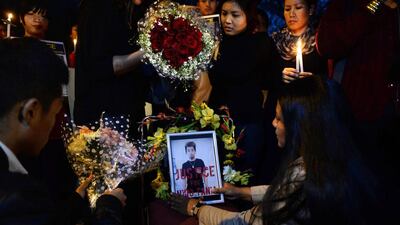New Delhi // In the two years since Jason Singsit moved to Delhi from his hometown in Assam, in north-eastern India, he has not gone a single day without being made to feel like an outsider.
On good days, the discomfort is relatively mild. “Somebody will ask me where I’m from,” said Mr Singsit, 24, who is studying to enter India’s civil service. “When I tell them, they’ll be really puzzled. They’ll ask: ‘Is that even in India?’”
On other days, the discrimination is more cruel. “We’ll be called ‘Chinky’ right to our face,” Mr Singsit said, referring to the racial epithet for people who have Chinese-like features, as most north-eastern Indians do. “It’s used as an insult.”
Mr Singsit is a Kuki, one of the myriad ethnic sub-groups from the seven states in north-east India, where close to 40 million people live. The states – Arunachal Pradesh, Assam, Sikkim, Tripura, Manipur, Mizoram and Nagaland – are home to more than 200 languages and dialects.
Discrimination against north-eastern Indians has come to the fore after two recent attacks in the capital.
Last Wednesday a 19-year-old student from Arunachal Pradesh, Nido Taniam, was beaten up in south Delhi, allegedly by a shopkeeper and his friends. He was found dead in his bed the next morning.
Four days earlier, two women from Manipur were racially abused and then assaulted by a group of men in a crowded south Delhi market. One of the women, Tharmila Jajo, told the Times of India that the men had called them prostitutes, and that the assault began after she reflexively kicked out at their dog, afraid that it would bite her.
On Saturday and then again yesterday, organisations of Indians from the north-east, many of them students, protested in central Delhi against the treatment meted out to them in their capital city.
They held signs expressing their frustration and confusion at facing such hostility in their own country. One read: “We’re Indians too!” Another showed a map of India with a question mark over its north-eastern states.
Complaints of racism circulate regularly in the Kuki Students Organisation representing Mr Singsit’s community of Kuki Assamese in Delhi: refusal of service at some establishments, insults, even violence. “It’s like we feel neglected by our own country,” Mr Singsit said.
Much of this racism stems from ignorance, said Chinglen Khumukcham, president of the Manipur Students Association of Delhi. People in Delhi know so little about north-east India that they are quick to fall back upon stereotypes – that the women are sexually permissive so they must be prostitutes, for example, or that the men cannot be trusted.
“In every single station of the Delhi Metro that I enter, the police check my bags for long periods of time, as if they are suspicious of me,” said Mr Khumukcham, a 23-year-old history student.
He frequently hears of students from the north-east being assaulted by street toughs or fellow students.
“The real problem here is that even when we go complain to the police, they are very, very slow to act,” he said. “In some cases, they don’t act at all. They just ignore the complaints we make.”
The two Manipuri women who were assaulted in south Delhi said police took almost eight hours to register their complaint, refusing outright at first and then demanding that they speak in Hindi – a language they know poorly. Their complaint was registered only after organisations of north-east Indians phoned a senior police official.
One man has been arrested on assault charges since then.
No arrests have been made in the case of Taniam’s death.
The controversy over Delhi’s treatment of north-east Indians comes soon after another incident of racism in the capital.
Two weeks ago, Delhi’s law minister, from the Aam Aadmi Party, led a vigilante raid on a south Delhi housing colony to round up African residents for supected prostitution and drug dealing.
The minister, Somnath Bharti, later said he was acting on concerns brought to him by the colony’s residents, who were wary of the Africans living in their midst.
Mr Bharti’s raid was stopped by the police, but not before he allegedly humiliated some of the African residents.
The question of why Delhi, always a magnet for migrants and one of India’s more cosmopolitan cities, has revealed itself to be so xenophobic is a pressing one, said Aparna Balachandran, a professor of history at Delhi University.
“I’m the resident tutor for the international hostel here, and my African students tell me all the time about the problems they have on the streets of Delhi,” she said.
Patterns of exclusion have always surfaced within the fabric of the city, Ms Balachandran said. Muslims have felt them deeply, for instance. “It’s only that this issue of race is relatively new, because the influx of perceived racial outsiders, from Africa or north-east India, is recent.”
The violence with which Delhi reacts to such outsiders is also new, she said. “This kind of everyday taunting, this prejudice that flares into physical assault – this is a worrying trend, and it doesn’t looks like it’s going away any time soon.”
ssubramanian@thenational.ae

